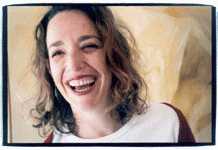AVIVA-Berlin >
Interviews
AVIVA-BERLIN.de im Februar 2026 -
Beitrag vom 11.01.2008

Interview with Ayelet Bargur. Breaking myths
Jennifer Gallagher
Israeli filmmaker Ayelet Bargur talks about her documentary "At the End of the Day", her impressions of Berlin as an `artist in residence` for 6 months and her future project.
AVIVA-Berlin: How did you become filmmaker?
Ayelet Bargur: I don`t know. (Laughs ...) I wasn`t ever a film freak. I was just a regular Israeli girl. (Laughs ...) I`ve always been interested in art and I`ve been sculpting all through my childhood. After the army I was one year in South America ã I travelled like all the Israelis. And then I came back and I said "Wow, what am I going to do?" Then I said, "OK, I`m good at arranging things and events so I`ll go and be a producer. But I`m not really interested in being a theatre producer, so I`ll go to film school." And I went to film school and I produced a lot of films there but I started to learn how to direct films. And I guess I was good at it. (Laughs ...) I felt too, that I can contribute more. I felt I have a lot to say.
AVIVA-Berlin: How do you feel about the two-year compulsory service in the Israeli army?
Ayelet Bargur: Part of being Israeli and part of your identity is serving in the army. So it wasn`t really a question. I wanted to do it. I needed to do it. I was looking forward all my life to doing it. It was from 1987 to 1989, so the time in Israel was relatively peaceful. I was in charge of the educational life at the army base. I was in charge of bringing films in, arranging the library and taking the soldiers out for trips. It was a great job. I was mostly dealing with moral questions when I led educational discussions with the soldiers. It was a different kind of service. It was very good for me. I grew up. I learnt to be independent. I had a good time. Today it`s a bit different, I guess.
AVIVA-Berlin: Why is that, do you think?
Ayelet Bargur: The majority of people still go to the army but there`s a percentage of young people that refuse to go into the army or serve in the occupied territories. When you`re 18 you ask yourself, "Where do I stand?" I taught in Israel for two years in a high school and we discussed this, "Where do we stand? Do I go here or there? Am I willing to do everything or what are my boundaries between my truth and my loyalty to the country?" They do raise different questions today.
AVIVA-Berlin: Your documentary `End of the Day` is about four families who become very close to each other after they lose their sons who died on duty in the Israeli army. In the film, the bereaved families share their very intimate feelings about their loss. You mentioned after the screening that the documentary is unique because it`s not a Memorial Day film. Could you say something more about that?
Ayelet Bargur: Memorial Day in Israel is almost a holy day. It`s one day in the year, the day before Independence Day which is in April or May, depending on the Jewish calendar. On Memorial Day, all of Israeli society is united in remembrance of all the soldiers who fell during the founding of the State of Israel. There`s no TV or radio on this day except all kinds of broadcasting that`s only connected to this day. So it`s usually a loop of films that are memorial films ã films telling battle stories or hero stories, and interviews with bereaved families and various commanders. They tell how wonderful they (the dead soldier) was and how he died a hero`s death. Usually what your hear is, "This is the job he had to do. This was for the State of Israel. This is the sacrifice we make." This is what the Israeli audience is used to seeing. The bereaved families are representative of Israel and of her political situation. But inside, when they meet, it`s not like that. They`re human, they are angry, they are frustrated, there are all kinds of different emotions. The film I made is an unique film because it`s the first time you enter this sacred temple of the bereaved. Usually the death of your son is used by the State, by the officials. This film breaks all kinds of myths in Israel ã they talk about the sperm problem. That was the first time on Israeli TV that someone has ever raised this issue. (AVIVA-Berlin: One of the bereaved mothers talks about regretting not having requested the sperm of her dead son.) Afterwards there was a big discussion about it. Another message of the film is that life has meaning. When you grow up in Israel and you see these Memorial Day films, you grow up thinking, "I want to be a hero. I want to die in battle. I want to be the best fighter in the world." I think what the bereaved families are saying at the end, is that it doesn`t matter how you died. What matters is how you live your life. This is another myth that was important for them to pass along. All these things were small pieces of messages that have never been heard in Israeli society from the bereaved families.

AVIVA-Berlin: Let`s change the subject now. You`ve been in Berlin for almost six months now. What are your impressions about the city?
Ayelet Bargur: That`s very hard to ask me that. (Laughs ...)
AVIVA-Berlin: Well, let me ask you this way. You`re here in Berlin because you received a stipendium ã a grant ã from the DAAD. Could you have gone somewhere else?
Ayelet Bargur: I asked for a stipendium here in Berlin.
AVIVA-Berlin: Why?
Ayelet Bargur: My research for my next project is connected to Berlin so I asked for a stipendium here in Berlin because I needed to be here. But Berlin! I felt I wanted to be here. I felt I needed to be here. I always thought, "I`ll live in Manhattan, New York." But it`s totally different." In Berlin, there`s something here, some kind of energy that`s hard to explain. It`s good energy. And that`s the kind of energy that I was interested in being a part of. And it`s also mixed for me, as an Israeli and a Jew to come here. Berlin is an amazing city. It offers a lot. But for me as an Israeli I keep my distance. I`m a bit suspicious. Being here, I cannot disregard the history. I think about it, I`m aware of it. This is a very interesting way to communicate and live in a place if you`re a bit suspicious.
AVIVA-Berlin: So you`re sort of on your toes?
Ayelet Bargur: I`m not on my toes but...I check. I`m not checking if people are anti-Jewish or not, it`s not this. It`s being aware of what happened here and what maybe could happen again here. It`s knowing the situation and just saying, "Keep your balance." I always give this example: It was a very hot summer and friends of mine said, "We`re going to take you for a swim in a lake." I said, "Great. Where are we going?" They said, "Oh, we`re going to have a great afternoon in Wannsee." I was like: Oh, I cannot have a good afternoon in Wannsee. Because my association is totally different. There the `Final Solution` committee met and I cannot go there and `have fun`. So for me, I`m talking with history all the time.
AVIVA-Berlin: Could you tell us something about your next project?
Ayelet Bargur: It`s concerns the history of my family before the war. I had here a greatgreat-aunt, the sister of my great-grandfather. Her name was Beate Berger. She was a director of the Jewish orphanage in Auguststr. in Berlin, Mitte. In 1933 when Hitler came to power, Beate Berger sensed a catastrophe. She decided to transfer the orphanage to Palestine, Israel. It was a big project, it was one woman`s vision ã she did almost everything alone. She couldn`t transfer all of the kids ã there were problems here and also there were problems in Palestine, Israel, at that time was under the British mandate. The first group left here in 1934, the second group left in 1935. Then big groups couldn`t leave anymore. She was going back and forth between Palestine and Berlin until 1939, one month before the war started. She brought 5 to 10 children each time. So she saved about 100 Jewish children from Germany. And when she couldn`t get children out of Germany, she worked and received certificates from the British mandate to get more children out from other countries in Europe. In the end she saved 300 children.
AVIVA-Berlin:We wish you every success with your new project. Perhaps you`ll come back to Berlin with a film for the Berlinale under your arm?
Ayelet Bargur: I hope so. That would be great!
Please do read our review on "Ahawah heiût Liebe" written by Ayelet Bargur
(Copyright photos: Zvia Oren)
Das Interview wurde in 2003 gefû¥hrt.